
|
|
Primary Sources: Unfinished Democracy
Just Next Door | Power Is In the Streets | Still Outspoken |
|
| Just Next Door |
Stop the Ku Klux Terror, 1949
Chicago Historical Society: Library Collection
The Civil Rights Congress founded by former Chicago alderman Earl Dickerson, created this flyer calling on supporters to join a protest of racist violence against African Americans. The flyer refers to the Park Manor riot of July 25, 1949, where a crowd of 2,000 whites gathered to oppose an African American man moving into a building at 7153 South St. Lawrence Avenue. Facing harassment by whites in public parks and sometimes violent resistance to housing integration, African Americans and their white allies pointed to freedom of movement as a basic right in a democratic society.
back to top
|
|
White Circle League of America, c.1955
Chicago Historical Society: Library Collection
Joseph Beauharnais, a South Side resident, founded the White Circle League of America shortly after the Park Manor housing riot of July 25, 1949. The League organized white Chicagoans in opposition to integrated housing and civil rights for African Americans. It was also an antiradical organization that sought to get the �Reds� out of America. The group produced this flyer, hoping to recruit one million members.
In 1951, the White Circle League argued before the U.S. Supreme Court, claiming the State of Illinois curtailed its free speech rights. The high court upheld lower court rulings that Chicago police could arrest Beauharnais for distributing racist literature.
back to top
| 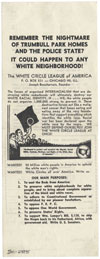 |
|
South Deering Bulletin, 1955
Chicago Historical Society: Library Collection
In July 1953, an African American family moved into the Chicago Housing Authority�s Trumbull Park Homes in Chicago�s South Deering neighborhood, touching off bitter opposition to integration on the part of some white residents of the working-class neighborhood. During the height of the Trumbull Park riots, roughly 1,000 uniformed officers in four shifts patrolled the area.
The South Deering Improvement Association was typical of white neighborhood organizations in cities across the U.S. that opposed racial integration from the 1940s through the 1960s. In publications like this issue of the South Deering Bulletin, they appealed to the racial and economic fears of white families who, like African Americans, were striving to improve their housing conditions.
back to top
|

Chicago Police at Trumbull Park Homes, 1953
Chicago Historical Society: Prints and Photographs Collection |
|
Chicago Sun-Times Office Memorandum Regarding
the Till Murder Trial, September 13, 1955
Newberry Library: Chicago Daily News Records
While visiting his relatives in Mississippi during the summer of 1955, fourteen-year old Chicagoan Emmett Till was lynched for allegedly whistling at a white woman. Till�s mother insisted on bringing her son�s body back to Chicago and having an open casket funeral. Thousands of black Chicagoans came to bear witness to his brutal killing, and Jet magazine published dramatic images of Till�s battered body. The state of Mississippi brought charges of murder against two white men, and an all-white jury quickly found them not guilty. The Department of Justice has recently re-opened an investigation into the case.
In this interoffice memorandum, the Chicago Sun-Times reveals its fears about how its white readers would react to the paper�s coverage of the trial.
back to top
|
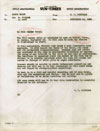 |
|
UPI Press Wire
Demonstration at the Chicago Sun-Times regarding editorial
�Now that the March is Over,� August 29, 1963
Newberry Library: Chicago Sun-Times Records
Chicago Area friends of SNCC
[Students Nonviolent Coordinating Committee]
Don�t Shop Downtown Until Willis Goes, c. 1963
Newberry Library: Chicago Sun-Times Records
While returning to Chicago by train from the 1963 March on Washington, some civil rights activists read a Sun-Times editorial critical of Martin Luther King, Jr., and other leaders. As this newswire transcript recounts, some 300 activists marched directly from the train station to the Sun-Times building to picket. The newspaper�s editors agreed to meet with leaders of the protest.
Later in 1963, Chicago activists distributed the �Stop! Don�t Shop Downtown� flyer during a campaign to oust Chicago Public Schools superintendent Benjamin Willis. Activists charged Willis with supporting segregated and inadequately funded schools for African Americans. In 1965, over 100,000 Chicago Public School students joined a two-day school boycott to protest the renewal of Willis�s contract by the Chicago Board of Education.
back to top
|
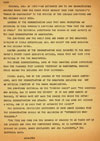
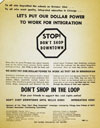
|
|
White Power!
Chicago, 1966
Chicago Historical Society: Library Collection
Hoping to extend the nonviolent civil rights movement to northern cities, Martin Luther King, Jr., led marches through several all-white Chicago neighborhoods and held a rally at Soldier Field in 1966. At the rally, Chicago civil rights activists, including the president of the United Packinghouse Workers of America, showed their support for King.
Echoing African American activists� call for �Black Power,� the American Nazi Party demanded �White Power� in their protest of King�s Chicago open housing campaign. Police arrested the Nazi�s leader George Lincoln Rockwell in an effort to disrupt the march and rally. Only about 100 people marched with the Nazis through the Gage Park neighborhood, and even fewer joined the rally at the Chicago Coliseum advertised in this flyer.
back to top
|
|
Letter from Chicago branch of the American Nazi Party to
Samuel Perlman of the Jewish War Veterans
1964
Chicago Historical Society: Archives and Manuscripts Collection
Samuel Perlman, who spearheaded the Jewish War Veterans of America�s effort to ban the Nazis from marching in Chicago, received this threatening message from the Chicago branch of the American Nazi Party in 1964. The note refers to 1972 because the Nazis believed their leader, George Lincoln Rockwell, would be elected U.S. president that year. The acronym �WUNS� stands for the World Union of National Socialists, an international Nazi group co-founded by Rockwell.
back to top
|

 |
|
Letter from Chicago Police Superintendent O.W. Wilson to
Herman Moses of the Jewish War Veterans
1966
Chicago Historical Society: Archives and Manuscripts Collection
In the summer of 1966, the Illinois branch of the Jewish War Veterans of America asked the city to bar the American Nazi Party from marching in Chicago. In this letter, Chicago Police Superintendent O.W. Wilson responds to this request, claiming the police department did not want to curtail the Nazi's �constitutional rights,� because this would make Chicago a �police state.�
back to top
|
|
| Power is in the Streets |
Pat Pastin
College of Complexes, n.d.
Newberry Library: Jack Conroy Papers
College of Complexes Curricula
Chicago: November 1960, June 1963, March 1965,
November 1965, May-August 1970, April 1972
Newberry Library: Slim Brundage Papers
Slim Brundage had been a bouncer at the Dill Pickle Club in the 1920s and the manager of a short-lived open forum known as the �Knowledge Box� in the 1930s. In the 1950s he opened his own club known as �The College of Complexes.� A bar and an open forum, the College sponsored lectures from all sides of the political and social spectrum, as these issues of the College�s newsletter, The Curriculum, suggest.
|
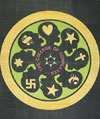
|
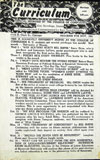
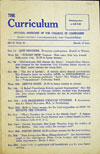
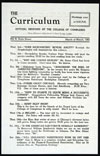
|
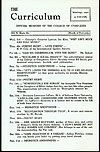
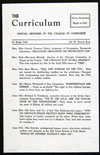
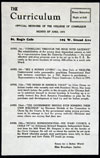
back to top
|
|
Interview with Slim Brundage, College of Complexes "janitor," on the "Studs Terkel Radio Program," WFMT-FM, Chicago, 1967
Chicago Historical Society: Archives and Manuscripts Collection
Author and actor Studs Terkel hosted the "Studs Terkel Radio Program" on WFMT-FM in Chicago from 1952 to 1997. Studs hosted a wide-ranging group of guests from politicians to performers often examining issues of free speech and dissent. In the excerpts provided here, he talks with College of Complexes hea "janitor" Slim Brundage about the history of Chicago's open forums and upcoming events at the College.
back to top
|
|
Chicago Gay Liberation Movement Supplement to the Seed, c.1970
Chicago Historical Society: Library Collection
The Chicago Seed, with its offices in the Lincoln Park neighborhood, was the voice of the student New Left in Chicago during the late 1960s and early 1970s. The Seed published this supplement for the Chicago Gay Liberation Movement. In it, the Movement proclaims, �We seek to inform those whose ignorance and resulting prejudices has oppressed us.�
back to top
|
|
Big Table 1
Chicago: Big Table, Inc., Spring 1959
Courtesy of Bill Savage
In 1959, the University of Chicago�s student-run literary magazine, Chicago Review, planned to publish excerpts from the avant-garde writings of William S. Burroughs and Jack Kerouac. When Chicago Daily News columnist Jack Mabley called the publication obscene, the University�s administration suppressed the magazine. Five of the six editors resigned and launched a new publication for avant-garde writings called Big Table, named for a note Kerouac wrote himself about his work space, �Get a bigger table.� The U.S. Post Office refused to ship copies, but Judge Julius J. Hoffman, better known for presiding over the trial of the Chicago Seven, found the Big Table not to be obscene.
back to top
|
|
| 1968-69: Chicago as Battleground
In August 1968, protestors descended upon Chicago to rally against the Vietnam War during the Democratic National Convention. Violence erupted several times between the police and demonstrators. A federal prosecutor charged eight radicals, known as the Chicago Eight, with inciting these �riots.� After the trial began in 1969, a few hundred Weathermen, a small radical faction of the Students for a Democratic Society, fought Chicago police with clubs and vandalized businesses and cars. Bobby Seale, a member of the Chicago Eight and Black Panther Party leader, had his trial severed from the other seven, and they became known as the Chicago Seven. The jury found five of the seven guilty, but an appeals court overturned these convictions based on trial irregularities.
|

Chicago police marshal against demonstrators during the Democratic National Convention, 1968
Chicago Historical Society: Prints and Photographs Collection
back to top
|

Demonstrators during the Democratic National Convention, 1968
Chicago Historical Society: Prints and Photographs Collection |
|
The Elections Don't Mean Shit, Vote Where Power Is,
Our Power is in the Street, 1968
Chicago Historical Society: Prints and Photographs Collection
The Students for a Democratic Society (SDS), which created this poster in protest against the 1968 presidential election, used the street as its political arena. Founded in 1960, SDS aimed to promote what it called �participatory democracy.� Although its membership was predominantly white and middle class, many SDS activists were influenced by the African American civil rights movement. After the chaos of Chicago�s Democratic National Convention, SDS located its ideal of participatory democracy in the street rather than in the voting booth. The poster�s images of the Chicago police and the 1968 convention riots underscore this point.
back to top
|
|
Chicago Policeman�s Riot Helmet, 1968
Chicago Historical Society: Decorative and Industrial Arts Collection
Thousands came to Chicago in August 1968 to protest the Democratic Party�s convention. Many of the protesters were young people voicing opposition to the war in Vietnam. They faced the billy clubs and tear gas of the Chicago Police Department. Although the city charged eight activists with inciting the riot, a national investigatory commission laid the blame on law enforcement, calling the disturbances a �police riot.� Chicago policeman Max O. Ziegler wore this helmet during the riots surrounding the 1968 Democratic National Convention.
back to top
|
|
Days of Rage Viet Cong Flag and Wooden Club, 1969
Chicago Historical Society:
Decorative and Industrial Arts Collection
For several days in early October 1969, the Weathermen faction of the Students for a Democratic Society led destructive marches through Chicago in support of the Chicago Eight. Using the slogan �bring the war back home,� the Weatherman hoped their �Days of Rage� would force Americans to confront the violence perpetrated by U.S. forces in Vietnam. This club and Viet Cong flag may have been carried by Weathermen during violent clashes with Chicago police on the night of October 8, 1969, near the Chicago Historical Society. Declaring a �state of war� with the U.S. government, the Weathermen carried out a series of bombings during the 1970s against government offices that caused a great deal of property damage but no injuries or fatalities.
back to top
|


Weathermen march south toward Chicago�s Loop during the Days of Rage, 1969
Chicago Historical Society: Prints and Photographs Collection |
|
The Chicago Women�s Liberation Rock Band, c. 1972, from left to right: Pat Miller, Naomi Weisstein, Sherry Jenkins, Suzanne Prescott, Fanya Mantalvo. Below: Susan Abod
Courtesy of the Chicago Women's Liberation Herstory Project www.cwluherstory.org
Economic Justice for Women, [1972-1974]
Courtesy of the Chicago Women's Liberation Herstory Project www.cwluherstory.org
In the fall of 1969, a group of women formed the Chicago Women�s Liberation Union (CWLU) in response to their frustration with male leadership of the civil rights, antiwar, and student movements. Like other feminist groups of the 1960s and 1970s, the CWLU helped women identify and articulate their critiques of mainstream society. Activists in the CWLU worked in a variety of community and political organizations and helped promote improvements in childcare, create access to abortions, and reform sexist policies in high schools and colleges. Their efforts to support feminist organizing led to the formation of �women�s liberation schools� and a rock and roll band, among many other activities.
back to top
|
|
Mountain Moving Day
The Chicago Women�s Liberation Rock Band, 1972
Courtesy of the Chicago Women's Liberation Herstory Project www.cwluherstory.org
back to top
|
|
Chicago Gay Pride, 1971
Chicago Historical Society: Library Collection
This publication promotes the 1971 Gay People�s Parade that started at Diversey Harbor and ended in the southern edge of Lincoln Park. The images on the front of this magazine portray the 1970 Gay Pride Week march that began in Bughouse Square (officially named Washington Square Park) just south of the Newberry Library. Since the early twentieth century, this park has been known as a free speech venue. Along with promoting the march, Chicago Gay Pride also covered issues such as the antiwar movement and religion.
back to top
|
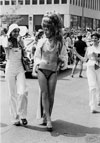
Chicago�s Gay Pride Parade, c. 1970
Chicago Historical Society: Prints and Photographs Collection
|
|
American Indian Center, 5th Annual American Indian Pow-Wow, 1953
Newberry Library: Virgil J. Vogel Research and Personal Papers
Chicago American Indian Conference, 1961
Newberry Library Archives
Organized in 1953, Chicago�s American Indian Center promoted a sense of community among Indians from diverse tribal groups. The annual pow-wow is an opportunity to showcase Indian dancing, music, and the arts and a time for community members to discuss political issues.
In 1961, a week-long gathering at the University of Chicago attracted hundreds of Indian people from across the country. The Chicago American Indian Conference resulted in a �Declaration of Indian Purpose� and helped mobilize a generation of Indian activists. This photograph illustrates both the broad representation at the conference and the growing strains of generational conflict. Attendees included Irene Mack (Menominee) at the microphone; fourth row right Father Peter Powell; third row right, second from aisle Clyde Warrior (Ponca), Mel Thom (Northern Pauite), and Leo La Clair (Muckleshoot).
back to top
|

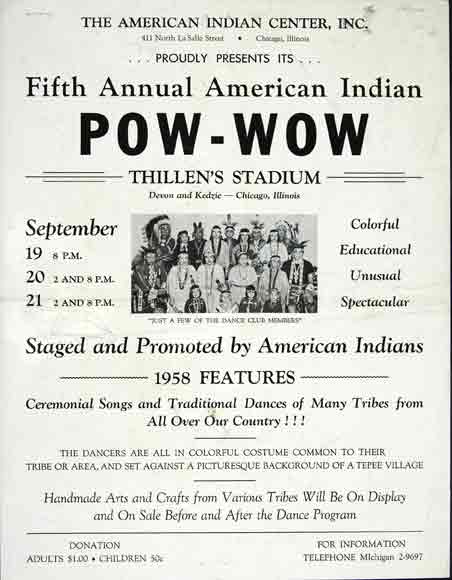
|
|
Chicago Indian Village, c. 1970
Newberry Library: Virgil J. Vogel Research and Personal Papers
The Indians at Argonne Fact Sheet, August 15, 1971
Newberry Library: Virgil J. Vogel Research and Personal Papers
In the late spring of 1970, a group of American Indians set up an encampment behind Wrigley Field. Led by Indian activist Mike Chosa, the Chicago Indian Village (CIV) protested against inadequate housing and social services for Chicago�s 15,000 American Indians. The following summer, Chosa led a group of fifty men, women, and children in a two-week occupation of an abandoned parcel of government land at Belmont Harbor. Evicted from the site, they took refuge at the Fourth Presbyterian Church. Later in 1971, the CIV occupied government land near Lemont, Illinois. As this CIV flyer illustrates, Chosa used the occupations to generate leverage with government agencies, such as the Office of Economic Opportunity (OEO), which he hoped would provide funds for social services.
back to top
|
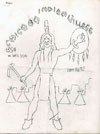
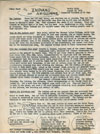 |
|
Black Panther Assassinated, c. 1969
Chicago Historical Society: Prints and Photographs Collection
At 4:45 A.M. on December 4, 1969, Chicago policemen surrounded an apartment at 2337 West Monroe Street where Fred Hampton, a leader of the Illinois Black Panther Party, slept. The police killed Hampton and another Panther leader, and wounded four others. This poster protests these assassinations and asks for monetary donations. The radical Chicago weekly Seed also published this poster as a special supplement. A representative of Chicago�s Afro-American Patrolmen�s League surveyed the apartment and declared the killings a �clear case of political assassination.�
back to top
|
|
Afro-American Patrolman�s League Police Brutality Complaint and Referral Registry, 1970-75
Chicago Historical Society: Archives and Manuscripts Collection
In the wake of the 1968 West Side riots, a group of African American policemen formed the Afro American Patrolman�s League (AAPL) to protest police brutality and to foster a greater role for black policemen. The AAPL maintained this registry of citizens� complaints of brutality and wrongful arrest. AAPL members tabulated complaints using a code that corresponded to offenses under Chicago�s disorderly conduct statute. Typically, an AAPL caseworker looked into the complaints and referred them to private law firms, civil liberties organizations, or the state attorney�s office.
back to top
|
|
Afro American Patrolman�s League Donation Container and Tags, c.1975
Chicago Historical Society: Decorative and Industrial Arts Collection
The Afro American Patrolman�s League (AAPL), a grassroots African American police reform organization, held �tag days� to raise money and publicize their activities. When supporters donated money they received an AAPL tag they could wear to demonstrate their support. Headquartered at 7126 South Jeffrey Boulevard, the AAPL was a neighborhood institution that reached out to South Siders. The AAPL�s logo, a raised black power fist in a police star, was a well-recognized symbol.
back to top
|

Renault Robinson, a co-founder of the Afro-American Patrolman�s League, in the League�s South Side office, Chicago, 1974
Chicago Historical Society: Prints and Photographs Collection
|
|
| Still Outspoken |
Wisconsin Steel Save Our Jobs News, c. 1985
Chicago Historical Society: Prints and Photographs Collection
Wisconsin Steel Save Our Jobs Button Belonging to Frank and Bea Lumpkin, c. 1985
Chicago Historical Society: Decorative and Industrial Arts Collection
Without warning on March 30, 1980, International Harvester permanently closed its subsidiary Wisconsin Steel on Chicago�s Southeast Side. Steelworkers were without jobs, pensions, and benefits. Steelworker Frank Lumpkin formed the Wisconsin Steel Save Our Jobs Committee to lobby the company for federally guaranteed pensions and benefits. This organization produced this newsletter, Wisconsin Steel Save Our Jobs News, to communicate with workers. Frank Lumpkin and his wife Bea wore Wisconsin Steel Save Our Jobs buttons during their many rallies in Chicago, Springfield, and Washington, D.C.
back to top
|
|
Justice Before Death I.H. Pay-Us-Now, c. 1987
Chicago Historical Society: Prints and Photographs Collection
Frank Lumpkin used this poster while protesting against International Harvester (IH). Save Our Jobs Committee wanted reparations from IH, the Chicago-based parent company of Wisconsin Steel. The red lettering of the sign mirrors Wisconsin Steel�s corporate colors.
back to top
|
|
Frank Lumpkin�s Overalls, c. 1980
Chicago Historical Society: Costume Collection
Frank Lumpkin, founder of the Wisconsin Steel Save Our Jobs Committee, wore these overalls while working as a �chipper� in the mill. A �chipper� removes imperfections from steel. The hazardous chemicals with which Lumpkin worked caused the overalls� many stains and holes. The numbers on the overalls tag, 300-2118, were Lumpkin�s �check number,� the way many companies identified their workers.
back to top
|
|
End the Occupation! U.S. Out of IRAQ Now
Not in Our Name, 2004
Courtesy of Don Bennis
How Many More Have to Die?, 2004
Courtesy of Ellen Schogene
War Party Playing Cards
Newberry Library Archives
In March 2003 the U.S. invaded Iraq and antiwar protesters from around the Midwest converged on Chicago in numbers far exceeding the expectations of organizers and police. More than 10,000 people marched up Lake Shore Drive until they were halted by the police. Some 800 were arrested. These signs were gathered at a March 2004 protest marking the anniversary of the Iraq invasion.
back to top
|
|
Denying Gays Marriage is State Enforced Discrimination, 2004
Courtesy of Ron Shaw
Chicago Tribune, March 5, 2004
Courtesy of Ron Shaw
Protect Marriage Now!, 2004
Collected at a Chicago demonstration March 31, 2004
Stop the Anti-Gay Bigots! Equal Marriage NOW!, 2004
Collected at a Chicago demonstration March 31, 2004
Click Here for Photographs of Selected Chicago Protests 2004
In the wake of successful legal challenges to laws banning homosexual relationships and prohibiting same-sex marriages, Chicagoans voiced their opinions for and against gay rights. Carrying a hand-painted sign decrying �defense of marriage� laws that limit marriage to opposite-sex couples, gay rights activist Ron Shaw sat down in the middle of Washington Street in an act of civil disobedience. As these items gathered at recent Chicago protests indicate, activists on both sides of the �gay marriage� issue have voiced their opinions.
back to top
|
|
Punk Planet, no. 50, July-August, 2002
www.punkplanet.com
Newberry Library: Wing fZP 2083.P924 box 3, no. 33
Lumpen, no.s 81 and 84
www.lumpen.com
Courtesy of Tobias Higbie
Trans Action, Fall, 2002
Private collection
Chicago Media Watch Report, Fall 2001
Courtesy of Tobias Higbie
|
Proof that I exist, no. 4, October, 2003
Private collection
The Baffler, no. 10, 1997
Courtesy of Jeffrey Janusch
War Against the Idiots, no. 29
Private collection
chicago.indymedia.org
Say �No� to the Air and Water Show [2004]
Courtesy of Tobias Higbie
|
|
Chicago continues to be a center of independent publishing and media. Today�s activists and community groups, like their early twentieth-century counterparts, produce a variety of magazines and pamphlets. With the advent of the Internet, Chicago activists have joined a worldwide movement to promote independent media. The Chicago �Indymedia" Web site is a collectively edited venue that activists use to promote events and share information that is not available through the commercial media. During recent street demonstrations, activist-reporters used the Indymedia site to post frequent updates on the status of marches and the actions of police.
back to top
|
|
|
|





























